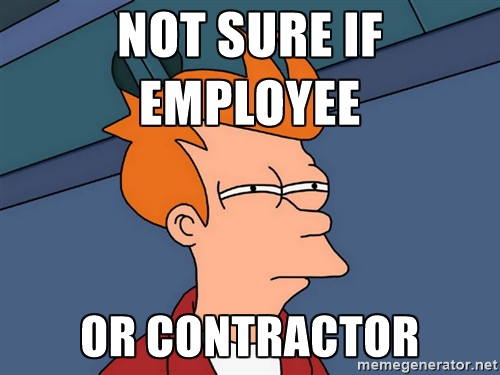Tear. It’s been a year. Your small business is growing before your eyes. You stare at your Profit and Loss statement for the hundredth time like a kid who’s been fervently measuring their height against the wall fixedly checks in on their progress, and your eyes fill with water. You really made it.
Your email inbox is flooded with fan mail. It’s wonderful and scary. You want to respond to all of them, even the creepy ones, you want to be Superman/Wonder Woman/the Hulk combined, deliver on your promise of top-notch service but you need help.
You can finally afford it, but who do you hire: an employee or a contractor?
We recommend that before you hire anyone as an employee you start them out as a contractor for a trial period. This way you can test them out and make sure they work well with you, are reliable and will not steal business from you before committing to a long-term agreement.
Once the initial trial period is over, ask yourself the following questions to give some clarity when trying to determine the best way to proceed with your expansion:
What is the nature of the project?
Will you need to control the time of those who help you and the sequence in which they complete tasks?
- Yes- Then you need an employee
- No- Then you can consider a contractor
Are you supplying all of the equipment?
- Yes- Then you need an employee
- No- Then you can consider a contractor
Do you need a very specific task completed?
- Specialized tasks are often completed by contractors however if it is an ongoing specialized task then you may want to consider hiring an employee.
How long will I be this busy?
Do you have a higher workload because you have taken on a short term, labour intensive contract?
- Yes- Then you can hire a contractor
- No- Then you should consider hiring an employee
Financial responsibility
Will the payment of the person you hire depend on you receiving payment for the overall contract?
- Yes- Then you can hire a contractor
- No- Then you should hire an employee
Training
Do you plan on providing training?
- Yes- Then you should hire an employee
- No- Then you can hire a contractor as they should already be trained.
What are the Financial differences
If you hire an employee
- You must match your employee’s CPP which is 5% of their gross earnings.
- You must pay 1.4 times the EI amount that the employee pays.
- You must remit taxes on behalf of the employee.
- You must supply your employee with the equipment necessary to complete the job.
If you hire a contractor
- They are responsible for paying their own CPP and taxes.
- They supply their own equipment.
- You cannot fire them without paying out the contract, they also cannot quit without finishing the contract.
As attractive as it may appear to hire a contractor over an employee you must make sure that your contractor is considered a contractor under the rules set out by the Canada Revenue Agency (CRA) or you risk experiencing heavy fines.
Stayed tuned for next week’s post where we will discuss the CRA employee or contractor checklist in more detail.



